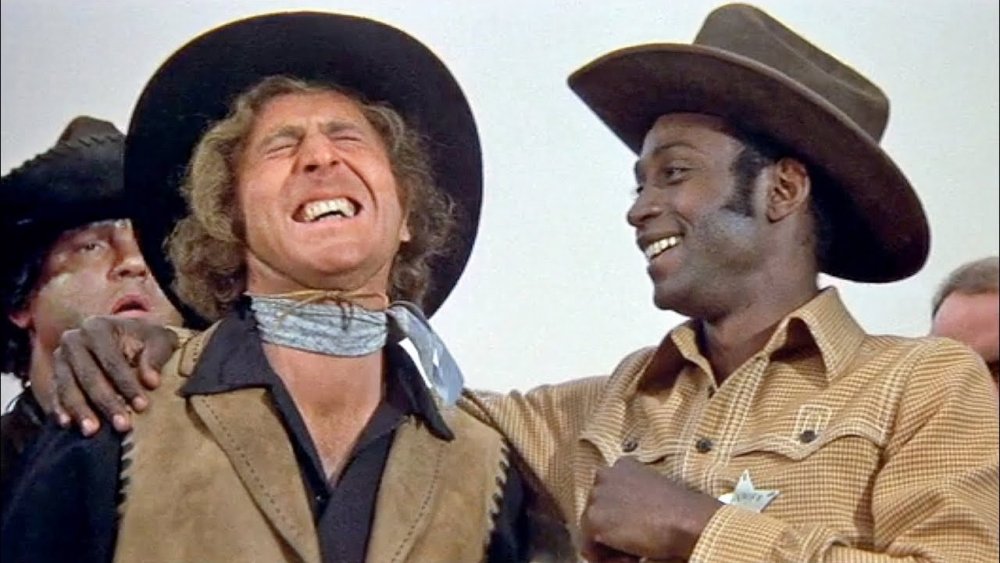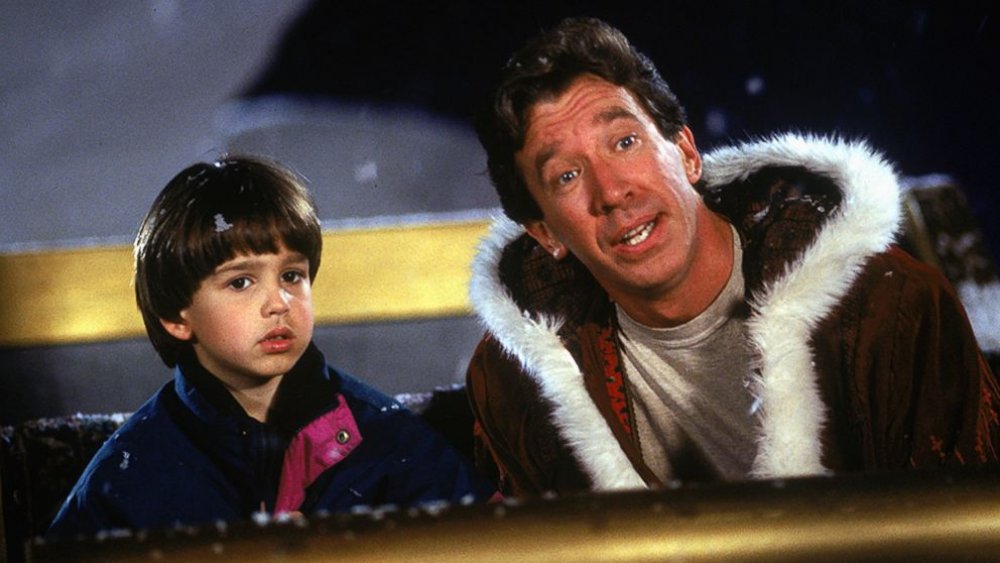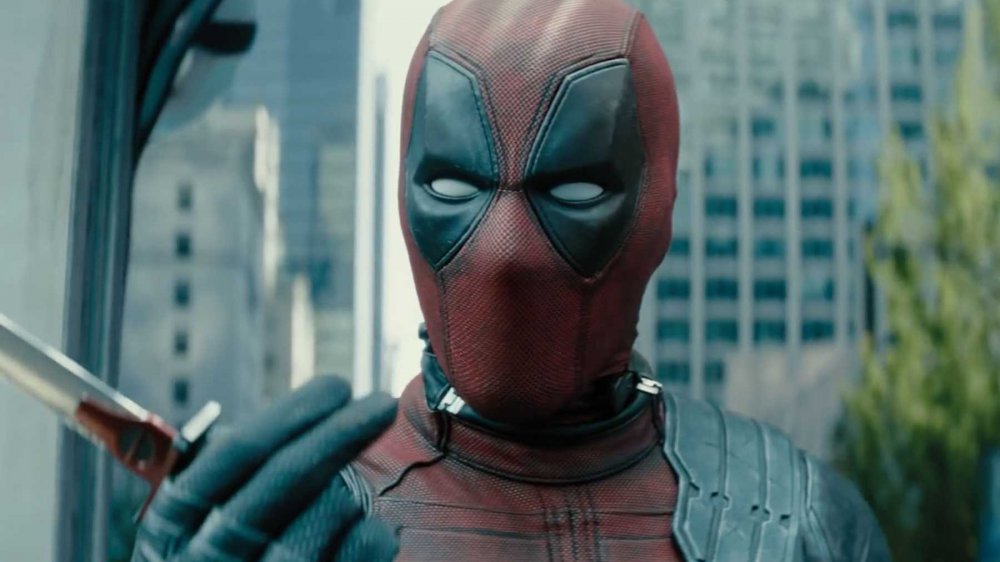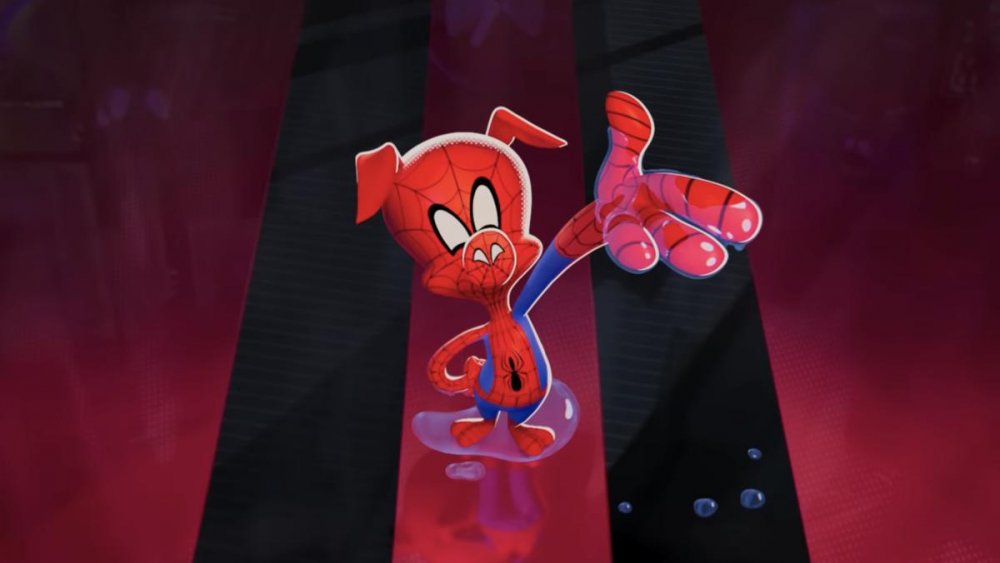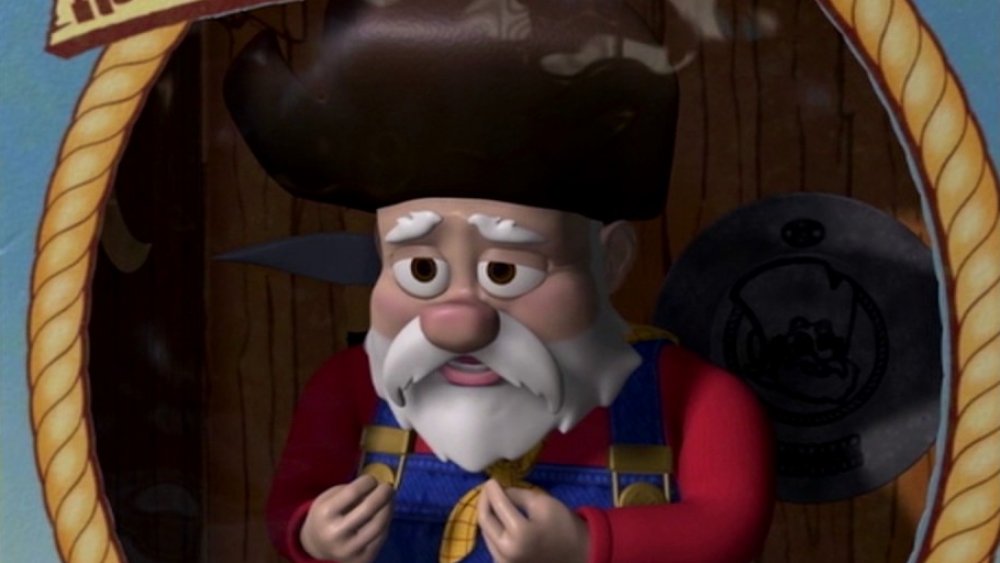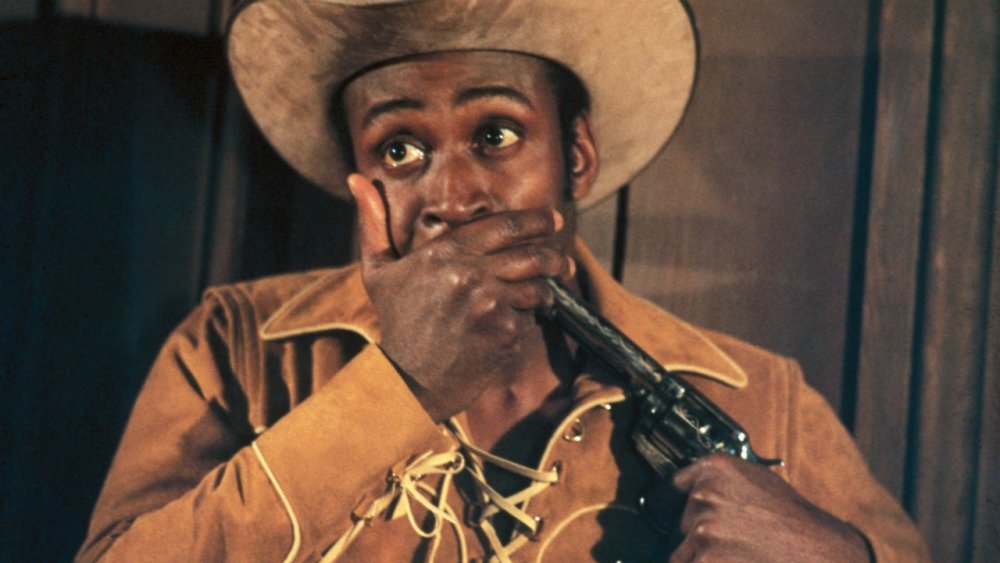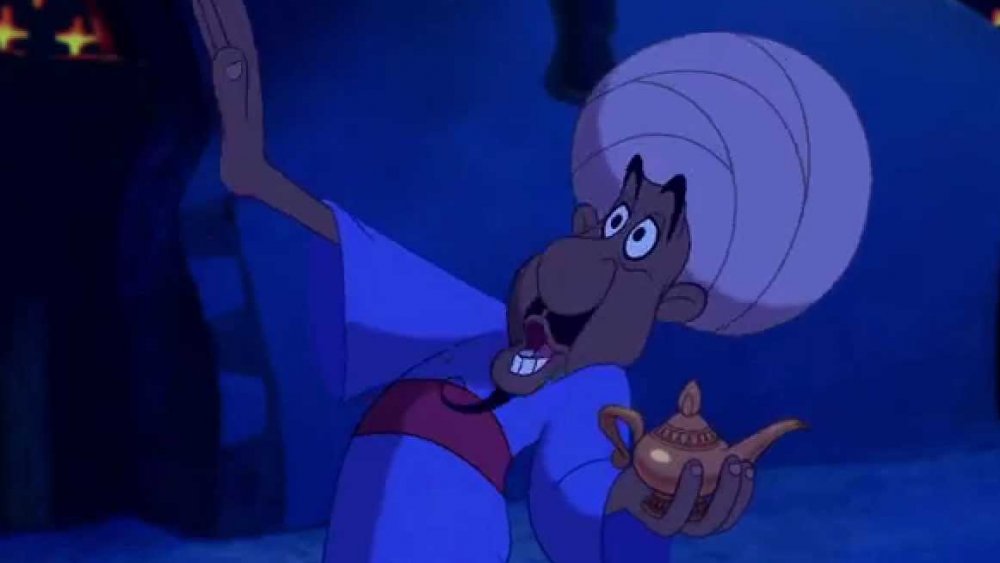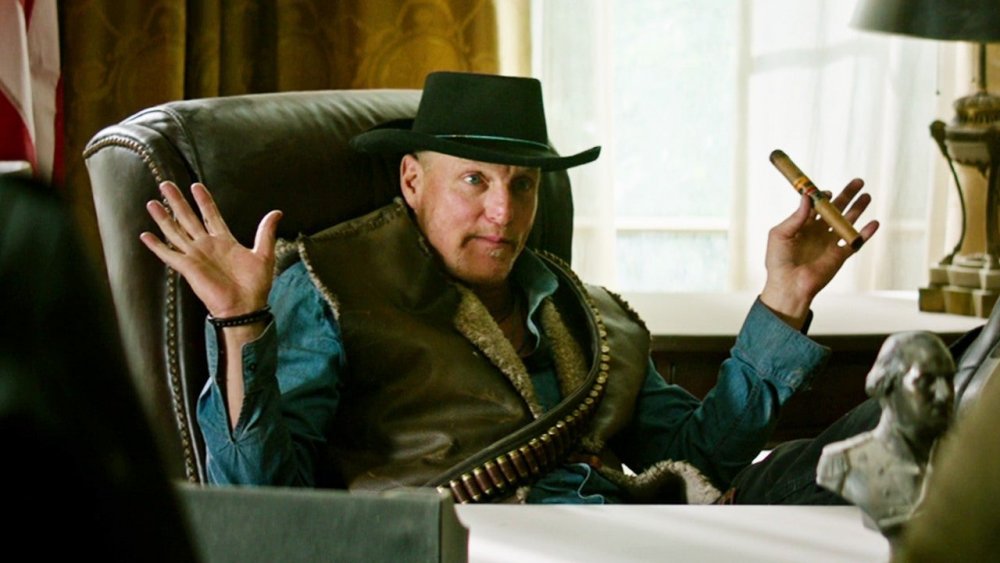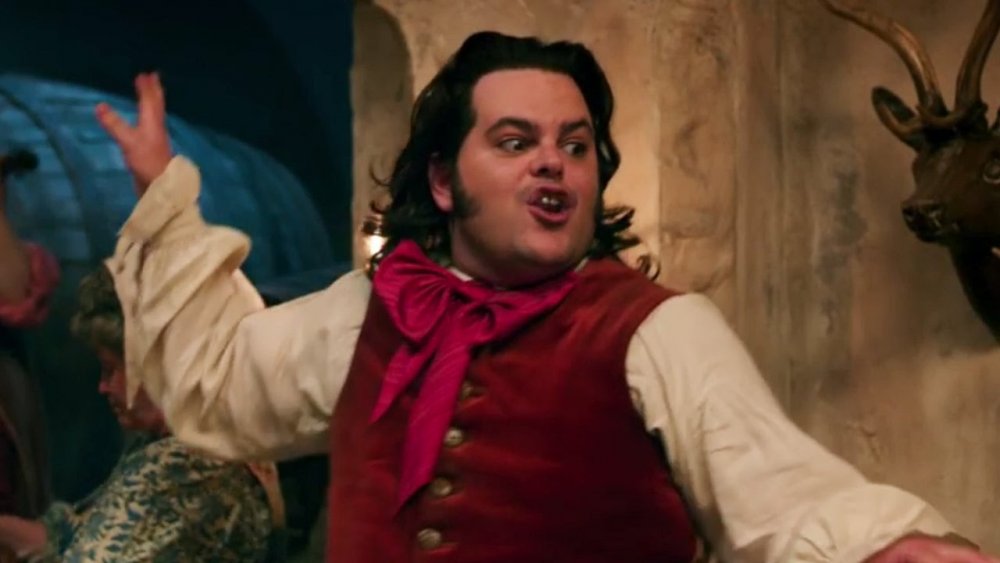Inappropriate Jokes That Were Cut From Movies
Comedy filmmaking is all about sustaining a certain mood, whether that mood is cheerful comfort or a deep sense of hilarious discomfort. If you're doing it right, you can keep whatever version of humor you're going for consistent enough that the feeling you set out to convey never leaves the viewer. They can just sit happily in that mood, laughing as the jokes hit them, for two hours without a single complaint. If you make that work, you can get away with jokes about a lot of things in the right context. That's part of the fun.
Of course, even the raunchiest and most irreverent comedy filmmakers also know that the wrong joke can upset the balance of all of this, and that's why even films that feel like they could go anywhere still end up leaving jokes on the cutting room floor. Then there are those films that do let those jokes fly, only to find that after audiences have heard them they seem so disruptive that they have to go even after their release. However it happened, here are a few examples of jokes cut from movies because they just went a little too far at exactly the wrong time.
The Santa Clause
The Santa Clause is one of the most beloved and perennially popular holiday comedies of the last 30 years, in part because it tries really hard to have something for everyone. Yes, at heart it's a family comedy with lots of magic and screwball comedy thrown in for the kids, but it's also got a handful of somewhat mature gags thrown in for the adults in the room. Over the course of the film viewers will find fat jokes, sex jokes, and all manner of other adult-oriented humor that kids won't get until they're a little older. That said, one such joke was apparently just too much for the whole family to handle.
One of the recurring gags in the film is Scott Calvin's intense dislike of his ex-wife's new husband Neal. He never lets up on the Neal jokes, or the jokes about Neal's family. In the theatrical version of the film, this included a moment in which Scott's ex Laura hands him a piece of paper with Neal's mother's phone number on it. Scott quips that the number is "1-800-SPANK-ME," which led to some kids actually dialing it up when they saw the film at home. It turns out that was actually a real sex line, so Disney cut the joke from future releases.
Deadpool 2
At first glance, the Deadpool franchise might feel like the kind of story that can go anywhere, particularly where humor is concerned. Ryan Reynolds' fourth wall-breaking, raunchy mercenary-turned-superhero always seems to be in a situation where he has nothing to lose and all the time in the world to get as merciless with the jokes as possible. It's hard to imagine something being so twisted that it ended up on the cutting room floor.
And yet, that's exactly what happened with one moment at the end of Deadpool 2. As you may recall, that film ends with Deadpool stealing Cable's time travel device and using it to go back and correct a number of mistakes, including Ryan Reynolds' attempt at a Green Lantern movie. According to Reynolds, the sequence originally also included a scene in which our hero goes back in time and contemplates killing an infant Adolf Hitler.
"None of us could come to a consensus on how to handle it, so our final decision was to just not handle it, to just not put it in the movie," Reynolds later explained. "We cut it out partially for time, but also to give us something really fun to add into the coda of the DVD."
Spider-Man: Into the Spider-Verse
Spider-Man: Into the Spider-Verse is an animated superhero adventure that takes advantage of a multiversal concept to introduce a tremendous ensemble of characters that all carry the Spider-Man mantle in some form. Each of these characters gained their own following when the film was released, but perhaps its biggest scene stealer turned out to be Spider-Ham, a cartoon pig version of Spider-Man voiced by John Mulaney. Spider-Ham, real name Peter Porker, won over audiences everywhere thanks to his frequent quips and cartoon mannerisms, but at least one of his rapid-fire jokes had to be cut even though everyone agreed it was funny.
Near the end of the film, as Miles Morales is suffering a crisis of confidence, Spider-Ham has a rare serious moment in which he explains to the young hero that all of the Spider-Verse heroes have lost someone. According to Sony Pictures executive Tom Rotham, though, Spider-Ham originally broke the seriousness with a joke, quipping that his Uncle Frankfurter was "electrocuted, and it smelled so good."
According to Rothman, the joke absolutely worked in test runs of the film, but the filmmakers ultimately decided the quip was "throwing off the energy" of the moment, and cut it.
Toy Story 2
We don't tend to associate Pixar films with inappropriate jokes. The award-winning, box office champion animation studio has been churning out hit after hit for more than 20 years, and they all seem to pack plenty of family-friendly fun without ever going over the line. Times change, though, and attitudes towards jokes change with them. It's that sense of changing attitudes which led Pixar to remove a particular gag from the end of one of its most popular films, Toy Story 2.
That film, like many early Pixar releases, ended with a "blooper reel" made up of supposed flubs created by the film's animators. In the middle of the reel, the prospector character Stinky Pete is shown flirting with two Barbie dolls and offering to get them a part in Toy Story 3. The scene is clearly meant to evoke the idea of a Hollywood "casting couch," a scenario in which Pete is trying to trade sex for acting roles. Years later, Variety reported that Pixar had quietly removed the moment from subsequent releases of the film in the wake of the #MeToo movement and allegations of misconduct against Pixar's own co-founder, John Lasseter.
Blazing Saddles
Blazing Saddles is one of the greatest comedies of all time in part because of the sense it creates that just about anything could happen within its runtime. Writer/director Mel Brooks seemed to take every possible opportunity for a joke, and he didn't shy away from gags about sex or race or even farting, which was a bit of a novelty at the time the film was made. Even Brooks has his limits, though, and that meant one particularly racy joke ended up on the cutting room floor despite the director having final cut in his contract.
As Brooks recounted, the scene involved Sheriff Bart and Lili von Shtupp sharing a romantic moment in her dressing room in which she blows out the candles, casting the scene into darkness. With the screen still dark, Lili asks "Is it true what they say about your people?" while moaning suggestively. Bart then replies, "I hate to disillusion you, ma'am, but you're sucking on my arm."
"That's a bit further than I should go," Brooks later said of the scene.
Aladdin (1992)
While Disney prides itself on being a family-friendly brand, the House of Mouse has seen plenty of controversy throughout the years, much of it stemming from various animated films that deal with people of color and various cultures outside the realm of Disney's American capitalist sensibilities. The studio has often managed to weather these storms and perhaps take advantage of future remakes and reissues to remedy them, but occasionally they don't wait that long to take action.
This was the case with Disney's 1992 film Aladdin, an extravagant Middle Eastern fantasy about a young street urchin who befriends a genie and becomes a prince. The film opens with a song titled "Arabian Nights," and attempts to set the scene by including the lines "Where they cut off your ear / If they don't like your face / It's barbaric, but hey, it's home."
The "But hey, it's home" quip at the end was meant to indicate a joking nature, but the Arab Anti-Discrimation Committee was not amused by the idea of casual violence being associated with their culture in a Disney film. After complaints, Disney changed the first two lines to "Where it's flat and immense / And the heat is intense."
Zombieland: Double Tap
It's common practice for a film's marketing team to use footage in trailers that doesn't actually end up in the final cut, or at least to alter the footage in such a way that spoilers are reduced. We've seen it happen so often at this point that we've come to understand that sometimes even the funniest moments from movie trailers won't make it into the final product.
Zombieland: Double Tap became part of this long tradition of cutting jokes featured in trailers from the final film when viewers noticed that a particular quip from the film's promotional materials was absent in the theatrical release. The joke in question is dropped in the middle of the gang's visit to the White House, when Tallahassee picks up a cigar, and the others tease him that the cigars have probably been in the House since "the Clinton administration." The joke is a reference to Clinton's infamous affair while in office, which included some... let's say creative uses for cigars. Whether the joke was deemed not funny enough, too political, or both, it ended up on the cutting room floor.
Shrek 2
We've talked about quite a few films that have altered jokes, edited them out, and even removed some jokes after their release after parents and other concerned parties complained, but Shrek 2 is the only film on this list that involved a joke actually triggering legal action. Yes, the sequel to Shrek actually had to briefly go to court for a joke that made one particular person very uncomfortable.
In the sequel, while talking to Shrek about neutering Puss in Boots, Donkey originally quipped that they should "Bobbitt" the cat, a joke aimed at John Wayne Bobbitt, whose genitals were famously mutilated. For the Hebrew dub of the film, the line was changed to reference David D'Or, an Israeli singer with a famously high voice. D'Or asked for and was granted an injunction against Shrek 2 distributors because the new joke implied he was "a eunuch" and it was causing distress for his family. As a result, the line was altered, and Donkey now references Bob Barker instead of Bobbitt or D'Or.
Beauty and the Beast (2017)
Disney's live-action remake of Beauty and the Beast features a number of expansions on the mythology of the original film. It's still the story of a beautiful young woman who falls in love with a Beast cursed to live in a castle with his many servants transformed into household objects, but this time around we learn a little bit more about how the curse works. This means the film gets to answer some lingering questions, including the matter of whether or not every single object in the castle is actually a living thing. The answer to that question is no, but the film almost made one particular object all too alive in a way that might have made people uncomfortable.
In one scene deleted from the finished film, Josh Gad's character LeFou escapes into a bathroom of the castle, only to find a talking toilet waiting for him. In a later deleted scene, after the curse is broken and all the possessed objects in the castle have become human again, LeFou complains that he smells something horrible. He then finds "Monsieur Toilette," now human but still reeking from all those years as a literal toilet, who then hurries away to brush his teeth. It might be something a lot of Beauty and the Beast fans have thought about, but it's not necessarily something we needed to see onscreen.
